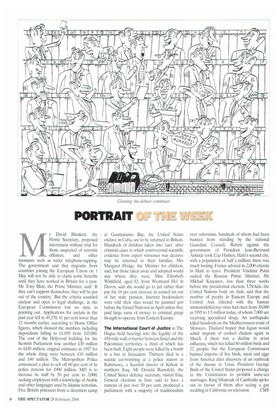PORTRAIT ii_
IHHHj — I —I /
,
Mr David Blunkett, the Home Secretary, proposed internment without trial for those suspected of terrorist
offences, and other measures such as wider telephone-tapping. The government said that migrants from countries joining the European Union on 1 May will not be able to claim some benefits until they have worked in Britain for a year. Mr Tony Blair, the Prime Minister, said: 'If they can't support themselves, they will be put Out of the country.' But the criteria sounded unclear and open to legal challenge, as the European Commission lost no time in pointing out. Applications for asylum in the past year fell to 49,370, 41 per cent lower than 12 months earlier, according to Home Office figures, which showed the numbers including dependants falling to 61,050 from 103,080, The cost of the Holyrood building for the Scottish Parliament rose another £30 million to £430 million; original estimates in 1997 for the whole thing were between £10 million and £40 million. The Metropolitan Police announced a plan to sell off 60 per cent of its police stations for £900 million. MI5 is to increase its staff by 50 per cent to 3,000, seeking employees with a knowledge of Arabic and other languages used by Islamic terrorists. Five British prisoners from a detention camp at Guantanamo Bay, the United States enclave in Cuba, are to be returned to Britain. Hundreds of children taken into 'care' after criminal cases in which controversial scientific evidence from expert witnesses was decisive may be returned to their families, Mrs Margaret Hodge, the Minister for children, said; but those taken away and adopted would stay where they were. Miss Elizabeth Winkfield, aged 83, from Westward Ho? in Devon. said she would go to jail rather than pay the 18 per cent increase in council tax out of her state pension. Internet bookmakers were told their sites would be jammed just before the Grand National in April unless they paid large sums of money to criminal gangs thought to operate from Eastern Europe.
The International Court of Justice in The Hague held hearings into the legality of the 450-mile wall or barrier between Israel and the Palestinian territories, a third of which has been built. Eight people were killed by a bomb in a bus in Jerusalem. Thirteen died in a suicide car-bombing at a police station at Rahimawa, a Kurdish district of Kirkuk in northern Iraq. Mr Donald Rumsfeld, the United States defence secretary, visited Iraq. General elections in Iran, said to have a turnout of just over 50 per cent, produced a parliament with a majority of traditionalists
over reformists, hundreds of whom had been banned from standing by the national Guardian Council. Rebels against the government of President Jean-Bertrand Aristide took Cap Haitien, Haiti's second city, with a population of half a million; there was much looting. France advised its 2,000 citizens in Haiti to leave. President Vladimir Putin sacked the Russian Prime Minister, Mr Mikhail Kasyanov, less than three weeks before the presidential election. UNAids, the United Nations body on Aids, said that the number of people in Eastern Europe and Central Asia infected with the human immunodeficiency virus had risen from 30,000 in 1995 to 1.5 million today, of whom 7,000 are receiving specialised drugs. An earthquake killed hundreds on the Mediterranean coast of Morocco. Thailand hoped that Japan would admit imports of cooked chicken again in March if there was a decline in avian influenza, which has killed 80 million birds and 22 people; but the European Commission banned imports of live birds, meat and eggs from America after discovery of an outbreak of the disease in Texas. President George Bush of the United States proposed a change in the Constitution to prohibit same-sex marriages. King Sihanouk of Cambodia spoke out in favour of them after seeing a gay wedding in California on television. CSH


























































 Previous page
Previous page